Following the seminar, a welcome reception was held to welcome 39 new scholars, including four open-track scholars pursuing a doctoral degree, from 18 countries. Representatives from the Japanese Ministry of Finance and the relevant embassies and central bank representative offices in Tokyo also attended to welcome the incoming scholars and wished them a successful start of their studies. In particular, Mr. Akihiko Yoshida, Director of the International Organizations Division of the Japanese Ministry of Finance, delivered a guest speech, encouraging the scholars to learn lessons from Japan’s experience and develop a human network. Mr. Batkhurel Serdavaa, Bank of Mongolia who commenced his Master studies at Hitotsubashi University, and Ms. Than Than Soe from the Central Bank of Myanmar who started a doctoral study at the IUJ, delivered speeches on behalf of the partnership and open-track scholars respectively. In their speeches, they shared their excitement at studying in Japan as JISPA scholars, thanked the Japanese government and the IMF for their assistance, and wished their fellow scholars success in their studies.


Completion of the Orientation Program: The 35 new partnership-track scholars successfully completed the Orientation Program at the International University of Japan. The program is a unique opportunity for all of the scholars to study on the same campus. As such, this experience helped them cultivate an identity as the Japan-IMF scholars and fostered a team spirit prior to moving to their own university for their core course studies.
 Scholar’s Comment: Experience about the about JISPA Orientation Programme (OP), JISPA Seminar and Welcome Reception of 22nd October, 2015. The Orientation Programme (OP) was the best prelude imaginable to the regular courses for all the JISPA scholars including me. The ‘OP’ as it is popularly known, provides an excellent learning experience especially to those who might not have been pursuing regular studies for some time because of being in regular employment with their Government or the Central Bank. This programme is held in the International University of Japan (IUJ), situated in the country side of Japan i.e. in Urasa which is a subdivision of the city of Minamiuonuma in Niigata Prefecture situated in the North Western part of Japan, about 350 Kms away from Tokyo. IUJ provides a natural setting to peep into the rich rural cultural life of Japan and to understand the various facets of agrarian life in Japan. The extensive and intensive coverage of subjects like Mathematics, Econometrics, Microeconomics, English and Japanese language prepares the scholars for their upcoming academic journey in Japan. I especially benefitted from the Mathematics OP classes in IUJ taught by one of the best Professor of Economics in Japan, Prof. Makoto Kakinaka.
Scholar’s Comment: Experience about the about JISPA Orientation Programme (OP), JISPA Seminar and Welcome Reception of 22nd October, 2015. The Orientation Programme (OP) was the best prelude imaginable to the regular courses for all the JISPA scholars including me. The ‘OP’ as it is popularly known, provides an excellent learning experience especially to those who might not have been pursuing regular studies for some time because of being in regular employment with their Government or the Central Bank. This programme is held in the International University of Japan (IUJ), situated in the country side of Japan i.e. in Urasa which is a subdivision of the city of Minamiuonuma in Niigata Prefecture situated in the North Western part of Japan, about 350 Kms away from Tokyo. IUJ provides a natural setting to peep into the rich rural cultural life of Japan and to understand the various facets of agrarian life in Japan. The extensive and intensive coverage of subjects like Mathematics, Econometrics, Microeconomics, English and Japanese language prepares the scholars for their upcoming academic journey in Japan. I especially benefitted from the Mathematics OP classes in IUJ taught by one of the best Professor of Economics in Japan, Prof. Makoto Kakinaka.
In addition to the OP, one of the regular events organized by JISPA, i.e. the JISPA Seminar series, provides a platform to know about research and developments in some of the frontier areas of economic research. This is an opportunity to know more about specialized topics of contemporary economic research and interact with specialists in these fields. The JISPA Seminars have broadened my outlook on the ongoing research in various fields. In addition, the interactive session in the Seminar is especially interesting as it is like a brainstorming session bringing out various other perspectives on the same issue. Such Seminars are a demonstration of the application of economic theories that we learn in the classrooms into empirical economic research. This exposure to the JISPA seminars is invaluable.
The first JISPA Seminar of 2015-16 was held on 22nd October 2015 and was followed by the welcome dinner. The paper that was presented during the seminar was informed to be a “work in progress” and was titled “Spillovers of Japanese Monetary Policy to Emerging Asia: a Global VAR analysis” authored by Giovanni Ganelli, Deputy Head of Office, IMF OAP and Nour Tawk, OAP intern. This paper tries to analyze and quantify the spillovers of “Quantitative and Qualitative Easing” (QQE) of Japan on various economic indicators of various emerging Asian economies like China, Thailand, Malaysia Indonesia and the Philippines by using the GVAR Model. Specifically it estimates the spillover of such a QQE through various channels like trade, finance etc. The study shows that there is a financial spillover both from the trade and FDI channel and the monetary easing (QQE) seems to have increased the GDP and equity prices for most of the countries covered under the study. However, most of the countries also witnessed temporary rise in inflation. In the Q&A session questions related to the choice of variables, like equity prices, as proxies for monetary policy shocks, were raised and alternative variables like monetary base were suggested. There were also suggestions and clarifications with regard to the specification of the GVAR model. Since the presentation was a work in progress the presenter took the suggestions into account for finalizing the results of the study. The Seminar ended with the applause of the audience. The Welcome Reception followed the JISPA Seminar. During the Welcome Reception, selected JISPA scholars shared their views about the programme and thanked the Japanese Government and the IMF on behalf of all JISPA scholars for providing such an excellent opportunity to come and study in Japan and learn.
(Mr. Abinash Dash, 2015-16, GRIPS,, Ministry of Finance, India)
OAP Hosted Seminars: The JISPA scholars were also invited to the following OAP seminars held in Tokyo:
- Reloading Abenomics: Priorities for the Needed Regime Shift
Speaker: Kalpana Kochhar, Deputy Director, Asia and Pacific Department, IMF
Date: September 04, 2015
- China: Recent Developments, Outlook, and Reforms
Speaker: Alfred Schipke, IMF Senior Resident Representative Beijing
Date: October 19, 2015
- The Global Economic Outlook
Speaker: Gian Maria Milesi-Ferretti, Deputy Director, IMF Research Department
Date: November 16, 2015
Back to top

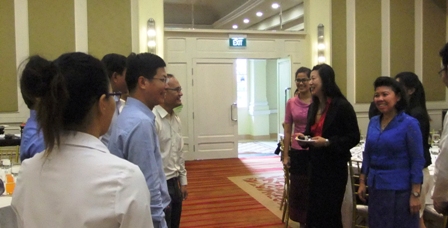
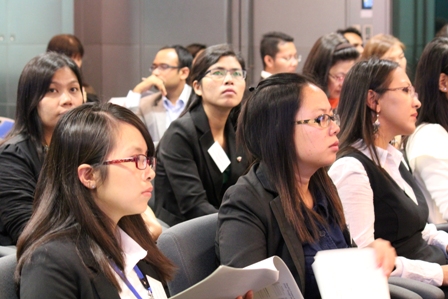 JISPA Seminar and Welcome Reception: On October 22, 2015, OAP organized a special seminar exclusively for the JISPA scholars, by Mr. Giovanni Ganelli, Deputy Head of Office, and Ms. Nour Tawk, Intern (both from OAP). They gave a presentation on “Spillovers from Japanese Monetary Policy to Emerging Asia: a Global VAR analysis” based on their on-going research seeking to quantify the effect of spillovers from Japanese QQE on Emerging Asian economies. The seminar aimed not only to explain the findings of their research but also to detail research methods so that the scholars could learn some “tips” to develop their own research. During the Q&A session following the seminar, the scholars and faculty members raised questions on the econometric methodology and interpretation of the results.
JISPA Seminar and Welcome Reception: On October 22, 2015, OAP organized a special seminar exclusively for the JISPA scholars, by Mr. Giovanni Ganelli, Deputy Head of Office, and Ms. Nour Tawk, Intern (both from OAP). They gave a presentation on “Spillovers from Japanese Monetary Policy to Emerging Asia: a Global VAR analysis” based on their on-going research seeking to quantify the effect of spillovers from Japanese QQE on Emerging Asian economies. The seminar aimed not only to explain the findings of their research but also to detail research methods so that the scholars could learn some “tips” to develop their own research. During the Q&A session following the seminar, the scholars and faculty members raised questions on the econometric methodology and interpretation of the results. Alumni Reunions: Alumni gatherings were held in Cambodia, Thailand, and Mongolia on the occasion of visits by Mr. Giovanni Ganelli, Deputy Head of Office, and Ms. Saika Kin, Programs Manager to those three countries to hear the needs of the authorities to better enhance the program as part of OAP’s effort in administering the JISPA.
Alumni Reunions: Alumni gatherings were held in Cambodia, Thailand, and Mongolia on the occasion of visits by Mr. Giovanni Ganelli, Deputy Head of Office, and Ms. Saika Kin, Programs Manager to those three countries to hear the needs of the authorities to better enhance the program as part of OAP’s effort in administering the JISPA.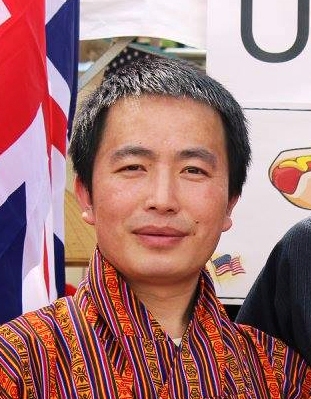 Mr. Tshering Dorji is currently on study leave from the Ministry of Finance, Bhutan. He is studying at the International University of Japan (AY2014-16). His hobbies are reading newspapers and sometimes playing indoor games. He also likes visiting places out of his university when he has free time.
Read More
Mr. Tshering Dorji is currently on study leave from the Ministry of Finance, Bhutan. He is studying at the International University of Japan (AY2014-16). His hobbies are reading newspapers and sometimes playing indoor games. He also likes visiting places out of his university when he has free time.
Read More
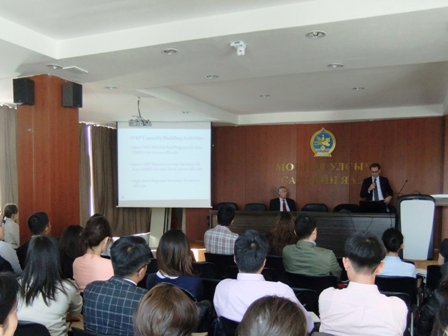



 Scholar’s Comment: Experience about the about JISPA Orientation Programme (OP), JISPA Seminar and Welcome Reception of 22nd October, 2015. The Orientation Programme (OP) was the best prelude imaginable to the regular courses for all the JISPA scholars including me. The ‘OP’ as it is popularly known, provides an excellent learning experience especially to those who might not have been pursuing regular studies for some time because of being in regular employment with their Government or the Central Bank. This programme is held in the International University of Japan (IUJ), situated in the country side of Japan i.e. in Urasa which is a subdivision of the city of Minamiuonuma in Niigata Prefecture situated in the North Western part of Japan, about 350 Kms away from Tokyo. IUJ provides a natural setting to peep into the rich rural cultural life of Japan and to understand the various facets of agrarian life in Japan. The extensive and intensive coverage of subjects like Mathematics, Econometrics, Microeconomics, English and Japanese language prepares the scholars for their upcoming academic journey in Japan. I especially benefitted from the Mathematics OP classes in IUJ taught by one of the best Professor of Economics in Japan, Prof. Makoto Kakinaka.
Scholar’s Comment: Experience about the about JISPA Orientation Programme (OP), JISPA Seminar and Welcome Reception of 22nd October, 2015. The Orientation Programme (OP) was the best prelude imaginable to the regular courses for all the JISPA scholars including me. The ‘OP’ as it is popularly known, provides an excellent learning experience especially to those who might not have been pursuing regular studies for some time because of being in regular employment with their Government or the Central Bank. This programme is held in the International University of Japan (IUJ), situated in the country side of Japan i.e. in Urasa which is a subdivision of the city of Minamiuonuma in Niigata Prefecture situated in the North Western part of Japan, about 350 Kms away from Tokyo. IUJ provides a natural setting to peep into the rich rural cultural life of Japan and to understand the various facets of agrarian life in Japan. The extensive and intensive coverage of subjects like Mathematics, Econometrics, Microeconomics, English and Japanese language prepares the scholars for their upcoming academic journey in Japan. I especially benefitted from the Mathematics OP classes in IUJ taught by one of the best Professor of Economics in Japan, Prof. Makoto Kakinaka. In Cambodia, the gathering was attended by the JISPA alumni, together with Ms. Sarah Zhou, the IMF Resident Representative and her staff. Ms. Zhou delivered the opening remarks, sharing her experience of studying abroad, and expressed appreciation for the human resource development fostered by the JISPA, as many JISPA scholars are her counterparts for policy dialogue. As a representative from successful alumni, H.E. Mrs. Sokha, Secretary of State of the Cambodian Ministry of Economy and Finance delivered a speech, sharing the benefits gained through her own experience of studying in Japan, and how this benefitted her career path. She also referred to challenges which she had faced to develop her career as a woman.
In Cambodia, the gathering was attended by the JISPA alumni, together with Ms. Sarah Zhou, the IMF Resident Representative and her staff. Ms. Zhou delivered the opening remarks, sharing her experience of studying abroad, and expressed appreciation for the human resource development fostered by the JISPA, as many JISPA scholars are her counterparts for policy dialogue. As a representative from successful alumni, H.E. Mrs. Sokha, Secretary of State of the Cambodian Ministry of Economy and Finance delivered a speech, sharing the benefits gained through her own experience of studying in Japan, and how this benefitted her career path. She also referred to challenges which she had faced to develop her career as a woman. The alumni gathering in Thailand was well attended. Since its inclusion in the JISPA in 2001, the number of scholars is steadly increasing. Dr. Nutavoot Pongsiri, the Assistant Governor of the Bank of Thailand, kindly took time to participate in the gathering and he received valuable views from the JISPA alumni about their experience with the scholarship program and their career progress after their return.
The alumni gathering in Thailand was well attended. Since its inclusion in the JISPA in 2001, the number of scholars is steadly increasing. Dr. Nutavoot Pongsiri, the Assistant Governor of the Bank of Thailand, kindly took time to participate in the gathering and he received valuable views from the JISPA alumni about their experience with the scholarship program and their career progress after their return. On October 13, an alumni gathering was held in Mongolia. The alumni appreciated the opportunity of the reunion, which was a rare occasion for them to get together as they work for different agencies. Mr. Dashdorj Luvsandash , Advisor to President, gave a speech representing the alumni, introducing himself as the first JISPA scholar from Mongolia and mentioning his experience in Japan which contributed to his career. Mr. Neil Saker, the IMF Resident Reprensentative for Mongolia, gave welcome remarks, and he noted that the JISPA alumni network includes some of the most talented economists in Mongolia who are in key positions.
On October 13, an alumni gathering was held in Mongolia. The alumni appreciated the opportunity of the reunion, which was a rare occasion for them to get together as they work for different agencies. Mr. Dashdorj Luvsandash , Advisor to President, gave a speech representing the alumni, introducing himself as the first JISPA scholar from Mongolia and mentioning his experience in Japan which contributed to his career. Mr. Neil Saker, the IMF Resident Reprensentative for Mongolia, gave welcome remarks, and he noted that the JISPA alumni network includes some of the most talented economists in Mongolia who are in key positions. The seminar was attended by about 30 participants, including IMF staff and policy makers from central banks and financial supervision institutions in the region. Two JISPA alumni, Mr. Lum Sam Ol, Off-Site Banking Supervision Department, the National Bank of Cambodia, and Mr. Visone Saysongkham, the Deputy Director General of Financial Institution Supervision Department, the Bank of the Lao PDR, attended the seminar and actively contributed to the discussion.
The seminar was attended by about 30 participants, including IMF staff and policy makers from central banks and financial supervision institutions in the region. Two JISPA alumni, Mr. Lum Sam Ol, Off-Site Banking Supervision Department, the National Bank of Cambodia, and Mr. Visone Saysongkham, the Deputy Director General of Financial Institution Supervision Department, the Bank of the Lao PDR, attended the seminar and actively contributed to the discussion.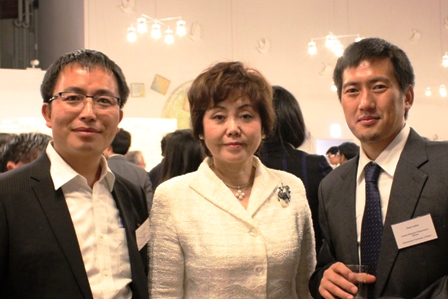 Update, compile and analyze macroeconomic data of Bhutan.
Update, compile and analyze macroeconomic data of Bhutan.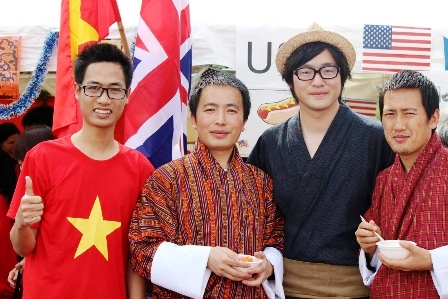 Unlike other scholarships, the JISPA scholarship in Japan is firstly linked only with renowned International universities in Japan.
Unlike other scholarships, the JISPA scholarship in Japan is firstly linked only with renowned International universities in Japan.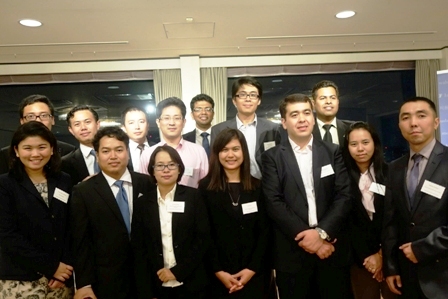 Honestly, I feel I have gained a great deal of knowledge and skills from JISPA. As mentioned in Q3, I am ready to apply these when I return to my real work. I am sure it will benefit my office dealing with macroeconomic issues of Bhutan.
Honestly, I feel I have gained a great deal of knowledge and skills from JISPA. As mentioned in Q3, I am ready to apply these when I return to my real work. I am sure it will benefit my office dealing with macroeconomic issues of Bhutan.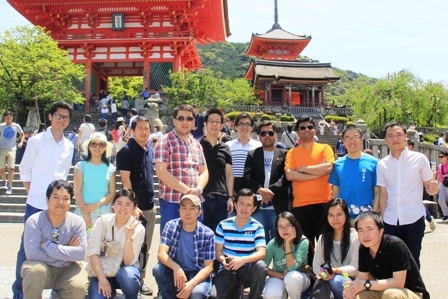 I will continue my work in the Ministry of Finance. To be become an Economist in the Ministry is my vision/dream. For this, my mission is to pursue a PhD (Economics) in the near future.
I will continue my work in the Ministry of Finance. To be become an Economist in the Ministry is my vision/dream. For this, my mission is to pursue a PhD (Economics) in the near future.